Equal Parts Brutal & Beautiful
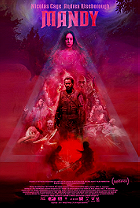 Posted : 6 years, 8 months ago on 4 June 2019 08:59
(A review of Mandy)
Posted : 6 years, 8 months ago on 4 June 2019 08:59
(A review of Mandy)This movie felt like it was tailor made for Nicholas Cage and it was great to see him in a fitting role again. I'd never heard of Panos Cosmatos before this film, but I certainly hope he directs more movies. As stylish revenge films with philosophical undertones go, this is top notch stuff.
 0 comments, Reply to this entry
0 comments, Reply to this entry
King of the Snores
 Posted : 6 years, 8 months ago on 4 June 2019 08:56
(A review of Godzilla: King of the Monsters)
Posted : 6 years, 8 months ago on 4 June 2019 08:56
(A review of Godzilla: King of the Monsters) 0 comments, Reply to this entry
0 comments, Reply to this entry
Hot Garbage
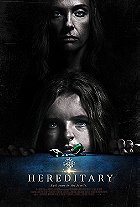 Posted : 7 years, 7 months ago on 1 July 2018 11:24
(A review of Hereditary)
Posted : 7 years, 7 months ago on 1 July 2018 11:24
(A review of Hereditary)Hereditary has a silly, disjointed plot and the scares are a jumble of every ghost story and haunted house cliche you've ever seen in a generic horror movie. The cast are a mismatched group who only know how to overact or underact. There was, maybe, one genuinely creepy scene in the entire film. The rest of the time I was rolling my eyes or snickering.
 0 comments, Reply to this entry
0 comments, Reply to this entry
So Close Yet So Far
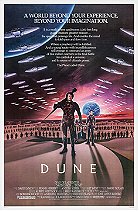 Posted : 7 years, 11 months ago on 5 March 2018 10:36
(A review of Dune)
Posted : 7 years, 11 months ago on 5 March 2018 10:36
(A review of Dune)Frank Herbert's universe had seemingly endless plots, subplots, characters and themes. Dune has all the sex, violence and political machinations of Game of Thrones while also concentrating on much more weighty issues like technology, ecology, drug use, spirituality, the destiny of mankind, etc. The depth of Dune is too much for any movie to come close to capturing and that's the brick wall that David Lynch runs into. He can't possibly do the source material justice; not on a thematic level anyway. He can only capture the forms and some of the spectacle from the first book.
That said, I did enjoy it slightly more this second time, probably because I was focusing on its artistic merit and what David Lynch does well rather than mercilessly comparing it to the scope of the books. The first half of the film is steady, well presented and follows the book fairly well but somewhere around the middle of the movie the pace dramatically speeds up and they start cramming way too much story into too little screen time as events hurtle toward a hasty, contrived conclusion.
I wish that Lynch hadn't shoved so many of the characters thoughts into recorded voice overs. Apparently this was done because the studio demanded he cut his original 3 hour version of the film by 40 minutes. I get that anyone who hasn't read Dune would have a hard time comprehending what was going on without all that exposition, but I think the film would've benefited greatly by saying less. Let the mysterious remain mysterious and focus on those inspired visuals! If people want to unravel it all, they can go back and read the novel. What a torture, to have to read one of the most important works of science fiction ever!
For all its flaws, the film nails quite a few elements of "Dune." It's very well cast and most of the costumes / sets are spot on. Even the pronunciations of Herbert's fictional terminology are mostly correct and Paul's dream sequences are splendid to behold, evoking the symbolism and artistry you expect to flow from the prose of the book.
The film ends on a bit of an eye roll. Muad Dib and the Fremen win a crazy one-sided battle, he kills Feyd in the duel (Sting was surprisingly good in this role for someone who's not, primarily, an actor), Paul proclaims a new dawn of humanity and it suddenly rains for the first time on Dune. Really David? That rain wasn't in the book and you couldn't think of a better way to end it? How about after the proclamation we have a nice long zoom in on Paul transitioning into visions of the future from the subsequent five books? Muad Dib's fall, the trials of his children, the God Emperor and the rise of the Honored Matres! Paul is soaked in spice at this point so he's already getting glimpses of the future. Even just a brief montage eluding to those events with the dramatic score in the background would've made a great ending to your acid trip of a movie! But no, we get a sadly typical put-a-bow-on-it Hollywood ending and fade to credits.
Despite its shortcomings, I'm not overly disappointed. Adapting Dune is too great a task for anyone and it was fun to see Lynch try. Although much of the substance is missing, he succeeded in capturing the dramatic weight of Dune and painting a dazzling silver screen portrait of my favorite novel. It will be interesting to see if Denis Villeneuve can do better.
 0 comments, Reply to this entry
0 comments, Reply to this entry
The Failure of Bushido
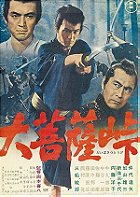 Posted : 8 years ago on 4 February 2018 09:09
(A review of The Sword of Doom)
Posted : 8 years ago on 4 February 2018 09:09
(A review of The Sword of Doom)An old man kneels to pray on the mountaintop trail of his pilgrimage. He pleads to Buddha for death so that he will no longer be a burden to his granddaughter. Appearing from a pure white cloud, seeming to step out of the sky itself, Ryunosuke arrives, dressed in pure black, ready to carry out the old man's wish. Is he just a wandering samurai? Is he the angel of death? Or is he, as the original title “Dai-bosatsu tôge” (The Great Bodhisattva Pass) might suggest, a “Danava”: a dark Asura from Buddhist mythology. This question is never answered directly and The Sword of Doom is a much better film for it. The mystery of Ryunosuke is far more compelling than any answer to his origin and purpose could possibly be.
From the opening scenes it's established that, mortal or not, Ryunosuke is an empty vessel with no compassion. His father, in their only encounter in the film, tells him to his face that he's cruel and disturbed. Ryunosuke agrees to an act of mercy on behalf of a fellow student only if the student's wife will sleep with him. Ryunosuke seems to approach the world with relentless selfishness and single minded ferocity, finding fulfillment only in conquest and death. He is, to put it mildly, a sociopath, which puts him at odds with the whole of Japanese society, a people culturally fixated on morals, shared responsibility, sacrifice and putting others first.
But who's to say that a sociopath can't be a great samurai? Like European chivalry, the code of Bushido had much to say about social ritual and character development, but in the end they were doctrines engaged in the futile attempt to make war, to some extent, “civil.” What if a man with no scruples and nothing at his core but a thirst for violence was to cast aside the moral platitudes of that system but still play, in a technical sense, by its rules? Would the world be a better place? Or would it be much worse?
The key to understanding Ryunosuke and the themes of The Sword of Doom lies, I believe, in a scene that takes place in the middle of the film. Having rented his skills out to the Shinsengumi (a secret force employed by the Shogunate), Ryunosuke and his party ambush a government official on a snowy winter night. They descend on their target only to discover that it's the wrong man. Rather than the political figure they were after, out steps Toranosuke Shimada, one of the greatest swordsmen in all of Japan. All but Ryunosuke attack him and Shimada cuts down their entire party in short order, leaving dozens of bodies strewn in the bloody snow. Ryunosuke watches in awe, but does not act. Shimada, sensing that he's no threat, sheathes his sword and speaks cryptically to Ryunosuke about good and evil.
Why?!? Until this point Ryunosuke has never shown a hint of hesitation. Most seem to attribute his actions to fear, but that's unlikely. We know he's a sociopath, we've already seen his supernatural skill, we're keenly aware that he finds an almost orgasmic bliss in violent confrontation and as a committed samurai, he's not afraid to die. This is not typical fear, this encounter has disturbed him on a much deeper level. So why doesn't he attack? The answer is simple: he can't. “Honor” forbids it.
Not only is he the wrong target, but Shimada never attacks him and so Ryunosuke can't respond. It should also be noted that Ryunosuke's cruel style of combat relies on baiting his opponents into striking first which he can read/sense with uncanny efficiency and counter-attack for a kill. But now he's met a virtuous samurai who won't be baited. Shimada is an “Aditya” (benevolent Asura) to his "Danava" and Ryunosuke is shaken for the first time.
If you study the film and review each violent incident that Ryunosuke is party to, you will notice one critical similarity. At no point does Ryunosuke ever violate Bushido:
1. Old man on the mountain prays to Buddha for death (mercy kill)
2. Official match vs Bunnojo (Bunnojo threatens his life with an illegal move, Ryunosuke kills him in defense)
3. Mountain ambush (self defense)
4. Assassination of clan official (Ryunosuke waits for the official to attack first, then kills him)
5. Assassination #2: (Shimada never threatens him so Ryunosuke doesn't act)
6. Killing his mistress (Hama attempts to murder him in his sleep, self defense)
7. Clan massacre/final scene (self defense)
Since Ryunosuke is an utter sociopath he has no way to internalize the morality that Bushido attempts to impart to its adherents, but nevertheless uses it as a system to govern his actions. He's someone who follows the rules of honorable conduct in combat while completely ignoring the spirit of Bushido. You could say he's the ultimate “lawful evil” character.
And yet, if we strip away Ryunosuke's sinister personality and simply compare his actions to the vast majority of samurai throughout history, are they really so different? It's in this frame that The Sword of Doom can be viewed as a criticism of Bushido and a dissection of the moral failings of Japan's (often glorified) samurai caste. Indeed, perhaps all samurai hold “the sword of doom” in their hands, no matter what philosophy they may incorporate to justify their actions. Ryunosuke is simply the most pure distillation of that reality laying bare the ugly truth.
Since this is a review in addition to an analysis, I want to focus on the aesthetics of the film for a bit. The Sword of Doom is one of the most beautiful films I've ever laid eyes on. The sets are immaculately conceived, the camera angles are diverse and the shots amazingly composed. It's use of black and white is so stunning that I wouldn't even want to see it in color.
The script is tight and, with the exception of a few historical footnotes, narrowly focused on moving the plot forward. The characters are well defined and even the minor ones impart meaningful dialogue. Tatsuya Nakadai portrays a brooding nihilist more skillfully than anyone I can think of and the movie is full of good performances from its supporting cast as well.
There are many period pieces where the action contains cartoonishly extended clashes between two characters, but The Sword of Doom's action set pieces are conducted smoothly with a dead seriousness that's only too appropriate for the movie's tone. Every face-off between two characters is over in moments, much like it would be in real life.
From the nonstop pounding of a water mill's hammer alluding to the illicit sex happening just off screen to the dizzying use of light and shadow in the lead-up to the grand finale, The Sword of Doom is also full of skillful visual tricks and metaphors. I've seen the film a dozen times and still feel like I've yet to discover all that's hidden in the depths of its images.
In the final scene Ryunosuke's past has caught up to him. His previous victims assail him psychically. He is trapped in a hall of shadows and assaulted on all sides by an endless stream of samurai as fire begins to rage around him. It's hard not to see this as symbolic of hell and yet his maniacal laughter informs us that he welcomes the chaos. Ryunosuke is trapped in an endless cycle of violence. “Honor” will not lead him out of it. Bushido cannot give him the basic humanity required to cultivate the virtues it prescribes. It can only justify his killing.
It's a shame we'll never get to see the next two films (The Sword of Doom was meant to be part one of a trilogy), but in a way I'm glad it ended where it did. There's no guarantee that subsequent entries would have been as good or that Ryunosuke's evolution would have been as interesting as the character study we're given. The Sword of Doom stands as a dark masterpiece and, in my opinion, the ultimate samurai film.
 0 comments, Reply to this entry
0 comments, Reply to this entry
A Poorly Plotted Mish Mash
 Posted : 8 years, 2 months ago on 22 December 2017 11:49
(A review of Star Wars: The Last Jedi)
Posted : 8 years, 2 months ago on 22 December 2017 11:49
(A review of Star Wars: The Last Jedi)1) Rian Johnson is clearly a better director than JJ Abrams and as a result the movie's flow and pace were much closer to what a Star Wars film should be.
2) A few genuinely good dramatic moments in the third act.
3) Of the OT stars, Mark Hamill aged the best and puts in a solid performance.
4) Not all of the humor is cringey. The movie did get a few chuckles out of me.
5) The light saber battle in the throne room was the first competent light saber action in Disney's Star Wars.
6) The Porgs were fun and cute. Surprisingly, I didn't hate them.
Cons:
1) Although Star Wars continues to improve on a technical level, the genesis of its plot and themes continues to be an abysmal mess.
2) Rey goes to get trained by Luke and, unsurprisingly, there's barely any training. What's the point? We already know she can do anything and anything she can't do now, she'll figure out in the moment she needs it.
3) Ham-fisted political themes are ham-fisted. (Funny how Revenge of the Sith took flack for this but The Last Jedi isn't.)
4) Most of the jokes in the movie are eye rollers. They were the kind of jokes I'd expect in comic book movies or a CW show, but certainly not in Star Wars. The audience seemed to eat it up, but it won't age well. Even if you liked the jokes, they don't match the tone of the movie at all. The Resistance is on death's door and Luke has been reinvented as a cynical, defeated hermit who no longer believes in the Jedi, but the movie can't go five minutes without someone cracking a joke!
5) What happened to Leia in a certain dramatic scene in space was more cringey than every misstep in the prequels combined.
6) The Snoke storyline was a joke. We know nothing about him, he becomes a Bond villain for 5 minutes, then he dies like a punk.
7) In the absolute worst use of Yoda ever, he shows up in ghost form, burns the old Jedi temple and tells Luke "Don't worry about Rey, she's got this." This is not at all a hypocritical departure from his insistence to Luke in The Empire Strikes Back of the dire importance of completing one's training before facing a Sith master.
8) Rose goes from "you're a traitor Finn" to "I love you" in 90 minutes, without even being on screen together that much. Talk about rushed, cliche romances.
9) Finn is now the dumbest character in Star Wars history. Jar Jar Binks has more character integrity than Finn. In TFA he went from "Not going back to Jakku!" to being trusted to complete Poe's mission because... ???, to wanting to leave the Resistance (again) that he never really joined, to sticking it out and fighting because he likes Rey and Poe, two people that he's only just met. That Rey, Poe, Han or anyone else trusts him when he keeps showing he can't be trusted is completely ludicrous. Similarly, in The Last Jedi he attempts to bug out on the Resistance at the first opportunity, then moments later concocts a plan to help save the Resistance (which fails) and that's the limit of his relevance. It basically amounts to the fact that you could cut Finn and Rose out of the entire movie and it would not make a single bit of difference to the plot.
10) Hoth 2.0 only with salt instead of ice (more copy catting.)
11) The force is evidently no longer a spiritual discipline that people train long and hard in order to master certain useful skills. It's now just magic that works because (reasons) and allows lazy writers to do whatever they want even if it doesn't make a lick of sense. This is true of not only the aforementioned Leia incident, but how Snoke links Rey and Kylo and what Luke does in the finale.
12) The parade of dumb titles continues. "The Force Awakens" made no sense because by definition the force is an energy field that can't go to sleep and to the extent it did "awaken" in one character, it was done in such a vague way that the title isn't pointing to anything tangible. "The Last Jedi" also makes no sense because it's specifically pointed out in the finale of the movie that Luke Skywalker will NOT be the last Jedi and given Rey's stance on the need for Jedi, there's no reason for us to assume that she will be the last either. Maybe start giving your titles some thought? Make SOME attempt to give them meaning? Oh, who am I kidding... it's 2017 and Disney is making Star Wars movies by committee.
The thing is, I liked The Last Jedi marginally more than The Force Awakens, but I can't give it a higher score because it has so many problems. I felt I was being somewhat generous in giving The Force Awakens a 5/10, but it feels like the perfect score for this film. The Last Jedi gets many of the forms right, but the substance of Star Wars is nowhere to be found.
 2 comments, Reply to this entry
2 comments, Reply to this entry
Return of the Eastern RPG
 Posted : 8 years, 3 months ago on 6 November 2017 07:26
(A review of NieR: Automata)
Posted : 8 years, 3 months ago on 6 November 2017 07:26
(A review of NieR: Automata)I've played some fine RPGs this year, but until now, none were compelling enough to warrant a full review. I binged on Persona 5 this spring, giving at least 120 hours of my life to another fantasy romp through modern Japan. It was definitely fun, but it wasn't groundbreaking like Persona 3 and 4 were on the PS2 10 years ago.
As the summer drew to a close, I dove into Final Fantasy 15, hungry for a game I'd been waiting forever to play. It was impressive on a purely technical level, but solid real time combat and driving a shiny car around a big open world couldn't mask my disappointment in almost every other facet of the game. After 10 years in development, the story was a scattershot mess with many undeveloped characters and a very rushed ending. The soundtrack, usually one of the finest aspects of the series, was underwhelming and only really stood out during the rare occasion you performed a summon. The story telling and drama, (by my measure, the two most important aspects of an RPG) had been sacrificed on the altar of westernization. At its core, Final Fantasy was no longer an eastern RPG. It had become just another open world western style game with endless busy work sidequests, the presentation of which became the focus of the game rather than developing an intriguing plot and meaningful characters.
At that point I thought maybe I was done with role playing games. Maybe the era of fascinating RPGs was over. Or maybe I was just getting old and the problem was me. Perhaps I had finally "outgrown" RPGs the way older folks who don't understand the appeal of videogames have been telling us we would grow out of them since we were teenagers. But then my gaze shifted to my stack of unplayed games and there was Nier: Automata.
Ok Japanese role playing, you get one last chance. A final fantasy, if you will. I had played the original Nier and two out of three Drakengard games, so I had some idea of what to expect from director Yoko Taro, but I was not prepared for the masterpiece that was about to unfold.
The world of Nier: Automata is Earth 9,900 years from now and it's a world drenched in melancholy. All that remains on the planet are the ruins of modern civilization and scraps of our culture that our descendant androids attempt to piece together. Conflict rages between the stoic androids and a quirky, but dangerous, robot race. The robots cartoonish looks are deceiving, for they possess a sinister collective AI that was bequeathed to them by a mysterious alien visitor. Allegedly, mankind yet survives, but whatever is left of them is safeguarded in a colony on the moon. The androids are charged with exterminating the robot menace and returning the planet to its rightful owner, their creators. "Glory to Mankind."
Our main charcters 2B (doesn't take long for this game to jump into philosophical musings) and 9S are thrust into this brutal situation, a merciless war in contrast with the serene beauty of a mostly deserted world. Few RPGs that I've ever played strike the masterful balance Nier: Automata does between what should be said and what's best left unsaid. In doing so, it respects the intelligence of its audience and crafts a haunting mystery that has you thinking and guessing from beginning to end.
The gameplay is almost exclusively fast paced action alternating between ground combat and sections of flight based combat in mechs. Both systems are fun, engaging and easy to control. There is also a hacking mini-game that resembles old school arcade shooters, but there's only a few times during 9S' story line that they are mandatory. It's a mostly optional part of the game that allows you to hack the enemy in situations where you find it useful.
The musical themes of this game will overwhelm you, likely getting stuck in your head for hours or days at a time. It does an amazing job of conveying the perplexity and desperation of the plot and of instilling in you the sense that not only has some great tragedy already occurred (even if you don't fully understand it) but that another one is yet to come.
Nier: Automata has some shrug-worthy fetch quests like most RPGs, but many of the sidequests are packed with story and meaning. One example: A male and female android are on the run from their former lives, abandoning their posts and attempting to flee and start a life together away from the war. If you choose to, you can help them several times as they try to escape and begin anew. In the last stage of the quest, they have failed, having been betrayed and attacked just when they thought they'd found an exit. At that point, the female android asks you to wipe both their minds so they can return to the resistance and forget that they ever had hope for something better. The male doesn't want to do it, but she assures him, they'll fall in love again even after the wipe. I won't reveal what happens next, but rest assured, an impact is felt.
One of the most endearing aspects of the game are the pacifist robots. A faction of the robot menace has decoupled from the alien intelligence, denounced violence and formed an enclave where they can gather and live peacefully. These beings are the most human creatures in the game, possessing a child like innocence that instantly engenders your sympathy and support. As these robots laugh, cry and express infinite curiosity, 2B, 9S and the other androids struggle with their emotions. It creates an interesting dynamic in the story, suggesting that how human you are is inversely proportional to how human you look and that mankind may have lost its humanity in full long ago.
Like the original Nier, the storyline of Nier: Automata is not told in one procedural line, but is divided into blocks. The first takes about 15-20 hours and each one thereafter takes less time. Each block adds important details to the story and the most dramatic elements are unlocked in the last few chapters. All told, you can complete its full story in 55 hours or less, and despite that relatively short length, it was vastly more fulfilling than any RPG I've played in a long time.
This game not only restored my confidence in the potential of the genre, its existence is proof that Japanese role playing survives as more than just a shell of its former self and that Square Enix has not yet lost all its good talent.
 0 comments, Reply to this entry
0 comments, Reply to this entry
Greatness, Within Reach, Goes Unrealized
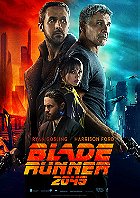 Posted : 8 years, 4 months ago on 11 October 2017 10:52
(A review of Blade Runner 2049)
Posted : 8 years, 4 months ago on 11 October 2017 10:52
(A review of Blade Runner 2049)The film dazzles when it introduces us to the technology of its dystopia, fixating the audience with innovations that capture the imagination and immediately make sense in the context of its devastated environment. Even more-so than the science, the landscape tells that tale of Earth in 2049. No dialogue is required as we move from a protein farm to the dingy, neon-lit, overcrowded city to an endless wasteland of junk metal and garbage. The sights and sounds convey all the background information that is necessary, eschewing exposition and trusting in the intelligence of the audience.
Unfortunately, by the end of its 2 1/2 hour run time, the story arc of our new main characters is sacrificed on the altar of old ones. The ending of the original Blade Runner is a piece of cinematic perfection due to its emotionally powerful climax followed by a conclusion that's equal parts tragedy, hope and intrigue. 2049 has an uninteresting climax and contains no such intrigue in its final moments; just some unresolved plot threads and a heaping dose of sentimentality.
Like the story, the soundtrack is hit and miss. It often rises to the occasion and provides a powerful and fitting audio accompaniment to the visual feast on screen, but at other times feels overbearing and lacks the subtlety and ethereal quality of Vangelis' original Blade Runner score.
I don't mean to sound overly harsh because I did enjoy this film, especially during its first two acts, but the bar for a sequel to classic cinema is high. Perhaps I'll have a different take upon subsequent viewings, but as I watched the credits roll for the first time, I couldn't escape the thought that the story needed more work to discover its own message and formulate a resolution that reverberated with its many magnificent pieces.
Pros
-------
Amazing visuals
Creative technologies that immerse and delight
Excellent setup that prompts many thoughts / questions
Setting and backstory feel like an authentic continuation of Blade Runner
Thoughtful film making that's more show than tell (most of the time)
Harrison Ford has one really good line
Cons
--------
Weak third act
Underdeveloped antagonist (who's not even part of the film's resolution)
Harrison Ford becomes baggage very quickly
The wrong elements become the focus (much like Ghost in the Shell earlier this year)
Soundtrack spiked to gratingly high levels at times
Plot becomes more muddled near the end rather than more clear
Science fiction should never rely on a "miracle" as a plot device
-------
Despite its final act shortcomings, Villeneuve did what few directors could have: make a Blade Runner sequel that did not disgrace the original.
 5 comments, Reply to this entry
5 comments, Reply to this entry
A Misanthropic Masterpiece
 Posted : 8 years, 5 months ago on 26 September 2017 09:03
(A review of Mother!)
Posted : 8 years, 5 months ago on 26 September 2017 09:03
(A review of Mother!) Darren Aronofsky drops an atomic bomb on the cinematic landscape, bringing passion and artistic vision to the box office where those qualities are in short supply. Mother! might be the most well crafted, intense and creative dissection of religious mythology ever made. It starts out as a slow burn mystery, feeling almost like a dream, but soon plunges forth into nightmare territory. It takes all the assumptions and contradictions of Christian dogma, contrasts them with the reality of our relationship to the Earth, and splatters them across the canvas in all their hideous cruelty.
This is not a film for people who like to have their hands held by simplistic plots, lots of exposition and a paint-by-numbers procession of events. That doesn't mean you need to be a genius to understand its ideas, but it does mean you're going to have to think and some knowledge of the Bible is handy in deciphering its threads. Most of the negative reviews I've read for Mother! were from people who made no attempt to understand it, claimed it's "pretentious" with no supporting argument, or they understood the film on some level but simply didn't like its message. By even engendering this strong of an emotional reaction, Darren Aronofsky has emerged victorious and demonstrated that his work is culturally relevant.
On top of its achievements in the realm of story and ideas, Mother! is also a visual and audio marvel, creating an atmosphere of utter claustrophobia that's as crushing to the audience as it is to the female lead. The tight camera angles and spiking soundtrack ramp up the tension as the movie proceeds from general unease to outright panic. This was a film that was designed to make its audience feel uncomfortable on multiple levels and it does so splendidly.
If you enjoyed Aronofsky's other head scratchers and psychological thrillers (Pi, Requiem For A Dream, The Fountain and Black Swan) you're going to love Mother! If you didn't like those films, chances are you won't like this one either. In the opinion of this reviewer, Darren Aronofsky has taken another step forward in an already impressive career, solidifying his place as one of the best directors of our time.
 0 comments, Reply to this entry
0 comments, Reply to this entry
The Search For Meaning
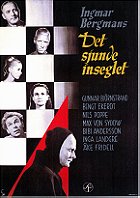 Posted : 8 years, 9 months ago on 10 May 2017 08:39
(A review of The Seventh Seal)
Posted : 8 years, 9 months ago on 10 May 2017 08:39
(A review of The Seventh Seal)I like The Seventh Seal more every time I see it. This is a movie that had the balls to flip religion the bird in 1957. It's a perfect tale of revelation and redemption, thrusting a mirror in front of the human condition.
A knight has returned from the Crusades, but his faith is shaken and the Bubonic plague spreads across the land. If that weren't crisis enough, death itself stalks him on the shores of his homeland and he finds himself playing chess with the reaper to buy himself a little time. But time for what? Time to do something, ANYTHING, to atone for the chaos and misery he wrought in the middle east; a campaign he now knows to have been arrogant, foolish and utterly without merit.
As the knight, his squire and the rest of our characters tour medieval Sweden, we see them confront every horror that the Dark Ages brought to bear. We see opportunistic theft, attempted rape, mockery and scapegoating out of total ignorance, and a mentally ill woman burned as a witch. Everyone is terrified of the black plague, and their inability to cope with it brings out the worst in humanity. As a troupe of bards attempt to alleviate a small town with songs and dance, a Christian passion play comes crashing through the streets, whipping themselves bloody, wailing and begging the sky for relief and forgiveness that will not come. No doubt they will spread the plague further before they drop their heavy wooden crosses and die in agony. Our main characters look on, wondering where the human race went wrong.
The knight endures all this while delaying his inevitable loss on the chess board and seeking answers to the questions that tear at his faith. In the end, none are satisfactory, and yet he remains stalwart in his quest for redemption. When death comes for him and his companions, the knight's good deeds have been accomplished and the cynical squire stares his mortality down, demonstrating that humanity can still perform at its best in the absolute worst circumstances.
There is virtually no fat in this film. It is clean in its beautiful black and white frames, crisp editing and purposeful dialogue. Although mostly bleak in their humor, there are a few laughs to be had among the 96 minutes of existential dread. We're even given a clarifying moment of hope and joy before the credits appear. This timeless piece is Ingmar Bergman's master work and it's as good as films get.
 0 comments, Reply to this entry
0 comments, Reply to this entry
 Login
Login
 Home
Home 17 Lists
17 Lists 36 Reviews
36 Reviews Collections
Collections